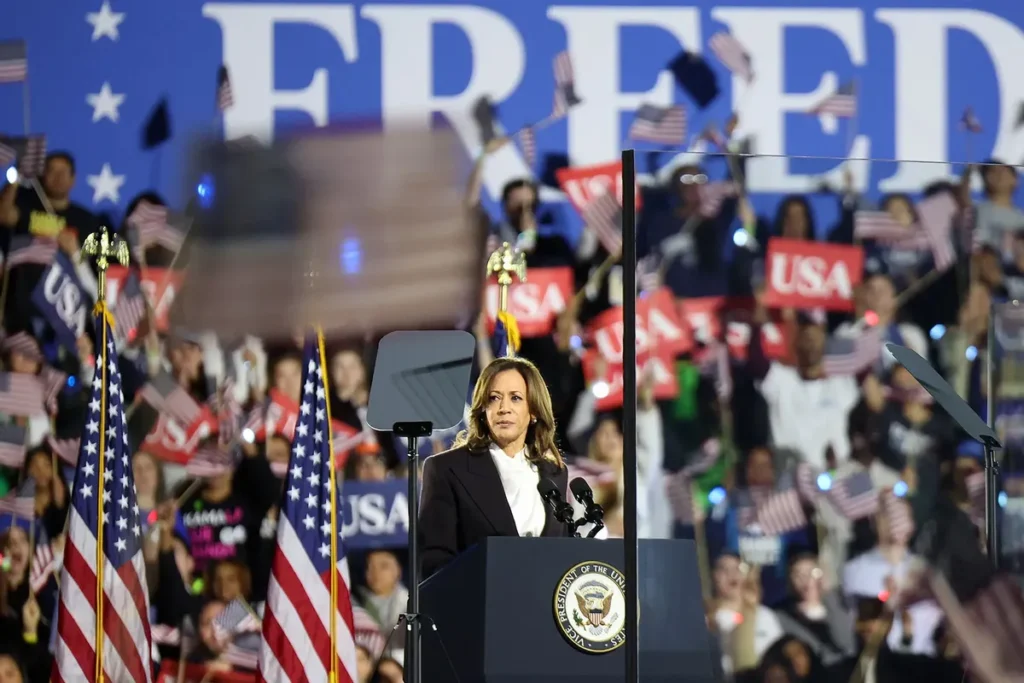“With Election Day just around the corner, the U.S. braces for one of the most intense and uncertain races in recent history. Here’s what’s fueling the anxiety and shaping voter perspectives as the final hours tick down.”

Rising Election Anxiety
Traditionally, elections in the U.S. are seen as moments of patriotism—a chance for Americans to exercise their democratic rights and move beyond political disagreements. However, the 2024 election has taken a different, more unsettling path. Reports of ballot box tampering, fears of political violence, and aggressive campaign rhetoric have created an atmosphere of deep tension.
The level of concern has shifted from the pandemic-driven election of 2020, where anxiety was tied to health safety, to a broader sense of foreboding. Now, voters are preparing for a different kind of uncertainty, adding to the apprehension as they head to the polls.
Campaigns Heighten Stakes as Rhetoric Escalates
Vice President Kamala Harris and former President Donald Trump have framed this election as a defining moment for the nation. Harris’s campaign has focused on critical issues like reproductive rights, sharing stories of women impacted by restrictive laws. Meanwhile, Trump’s campaign has spotlighted crime and immigration, emphasizing national security and warning about potential threats.
The buildup to Election Day has been marked by a string of violent incidents. From arson attacks on ballot boxes to threats targeting campaign supporters, the undercurrent of potential unrest is clear. Specific reports include a machete-wielding man confronting voters in Florida and precautionary school closures during Trump rallies in Pennsylvania.

A Country Split by Concerns and Warnings
Historians looking for parallels in American history often refer to times like the Civil War or the social upheaval of the 1960s. However, today’s climate stands out due to a mix of distrust in the electoral process, conspiratorial thinking, and sharp rhetoric. While some Americans brace for the possibility of unrest, others express cautious hope that stability will prevail.
Recent polls reflect this anxiety. Research from the American Psychological Association indicates that a significant portion of the public is concerned about post-election violence, with many believing that this election could have severe implications for the future of American democracy.

The Voices of Voters: A Glimpse Into the Tensions
Interviews with voters in battleground states reveal deep-seated fears and hopes. In Michigan, some expressed concern over potential violence no matter the outcome, attributing it to Trump’s discourse. A voter in Wisconsin spoke of exhaustion and anticipation for the election’s end, while a factory worker in Pennsylvania turned to faith for reassurance.
Harris’s campaign stops in Michigan focused on uniting different communities, including African American and Arab American voters, to bolster her support. Trump, on the other hand, intensified his rallies in North Carolina and Pennsylvania, emphasizing strict policies on immigration and his commitment to maintaining order.
Fear and Resilience
The election’s divisiveness has affected personal relationships and everyday conversations. In Michigan, one voter admitted feeling the need to avoid openly discussing political support due to potential intimidation, a sign of how charged the atmosphere has become.
Amid this tension, there are moments of hope. In Pennsylvania, a critical swing state, some voters expressed determination and belief in the resilience of the nation. For many, casting a vote is not just about choosing a leader but about taking control of their future and reinforcing the democratic process.
The Road Ahead
As the U.S. approaches Election Day, the country stands at a crossroads. The outcome will influence not just leadership but the tone and unity of the nation. While the path forward remains uncertain, the act of voting symbolizes a step toward shaping what comes next.
